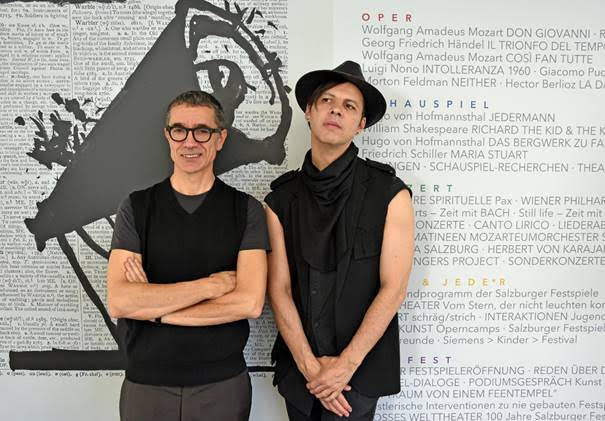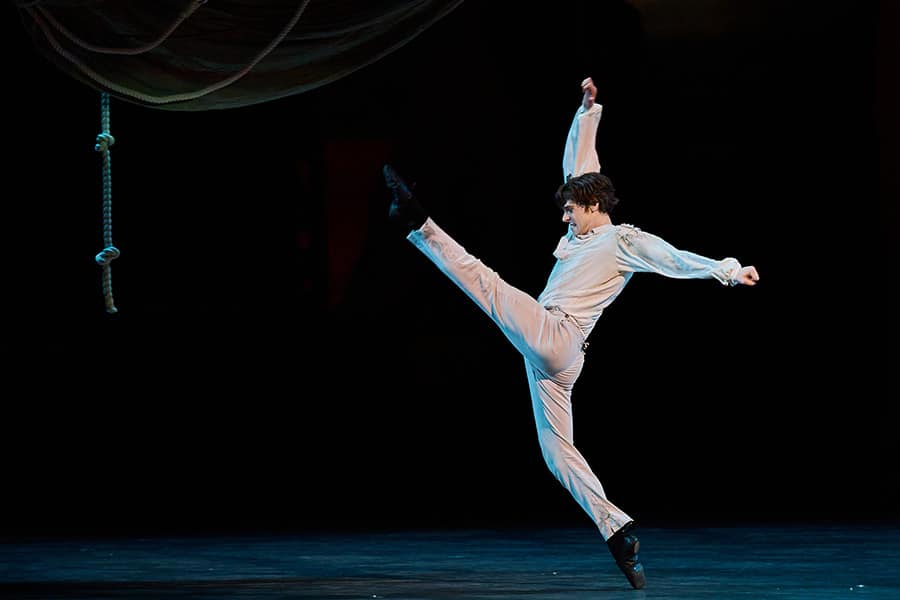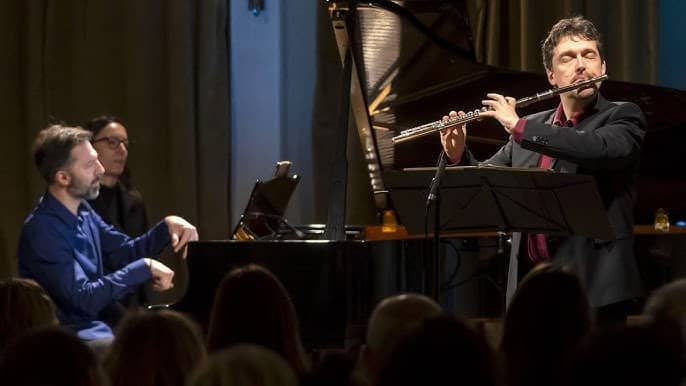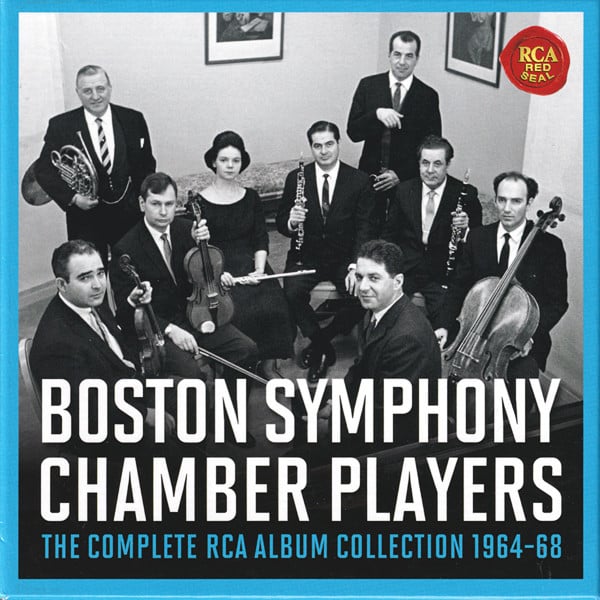Furious FAZ attack on Currentzis for ‘shameless ego trip’
NewsThe Frankfurter Allgemeine Zeitung, not a paper prone to strong language, has launched a brutal assault on the calculated eccentricities of the Greek-Russian conductor Teodor Currentzis, who was selected by the Salzburg Festival to conduct Mozart’s Don Giovanni.
In an exceptionally colourful polemic, the veteran commentator and author Jürgen Kesting lets rip:
… After an aesthetic terrorist attack like the Salzburg “Don Giovanni” staged with a mallet, it is not easy to organize one’s thoughts. I found the performance, with ideas and punch lines propelled like grapeshot, a nuisance…. Was it the director or the conductor, both sacred cows?
… Strange that visitors to “Don Giovanni” feted the shameless ego trip of the conductor Teodor Currentzis, who heaved himself onto the stage with his orchestra and was celebrated as the real protagonist in a blaze of strobe lights. While the public may no longer flock to the former priests of high art, it now harkens to the call of a sect leader, cheering an egomaniac radiated by media fame without suspecting or feeling that it is despised by him.
That’s telling ’em. Read on here.







As an observer of Europe for decades, and speaking very broadly, overly broadly, it seems that no one has more talent for invoking Teutonic wrath than Greeks. Not even Italians. Anyway, I hope Herr Kesting will be able to keep the virgin purity of Mozart away from Don Greco.
utterly fabulous. teo has been a caricature of himself for at least five years running. blame Hinterhäuser for this one. and well, everyone else who thinks the vampire is worth the ticket price. and i say this as someone who has spent considerable time in the pit and on stage with him. enuf to leave one racing for a Xanax refil.
YES YES YES A HUNDRED TIMES! Thank you for saying what people do not dare… This preening charlatan seems to be a ‘sacred cow’ indeed. Shame on Hinterhäuser for buying in to his egotistical nonsense.
He has been a caricature of himself for over 20 years! Finally a critic willing to speak the truth.
… Not to mention TC and his three eyes’ starring role in the movie “Dau” — yet more exhibitionism from the man who’s perfected the practice.
https://slippedisc.com/2019/02/the-conductor-who-shows-off-his-parts/
It’s the zeitgeist; he’s merely hitched his wagon to this. All about me, me, me, me, me….and me. Look at me; think about me; think about my needs, my disadvantages, my entitlements.
Finally, someone says it as it is – Teodor Currentzis is an absolute conducting charlatan. The ghosts of past conducting greats must be doing somersaults in their graves, and rightfully so.
But he is not a charlatan. He is a good conductor. That’s the problem.
Correntzizi a good conductor??
You are kidding!!!!
I have watched him and recorded him more times than I care to remember.
Some of the most hideous music making I have ever heard.
The critique is totally correct, especially his smart massive rip-off of PERM region to the tune of millions of dollars, – leading a cult.
The only conductor out-maxxing that “zis” guy is that cretin “parkinson” Gergiev.
All corrupt right down to the marrow of their bones.
Indeed, his recordings are highly idiosyncratic and full of life. Like him or not, he is musically skilled and original. He may be too original for many people though.
… once before I attended semi-staged “Don” ( with top-notch cast though). The winds and some violins were onstage , it made a special ambience in some mise-en-scenes. Actually I, mainly, listened to singers. Both Donna Anna and Donna Elvira were extremely good. Also I can reminisce about Zerlina and Giovanni duo…. I hope Mr.Currentzis behaved himself at Salzborough 😉
Herr Kesting asks two pertinent questions in his final paragraphs:
1. Is it a true mark of progress that the age of ‘conductor absolutism’ as the incarnation of power has come to an end?
2. Has the creation of audiences become the greatest achievement of cultural production?
The answer to Herr Kesting’s second question, given his premise, is easy, and it is a resounding YES.
The problem is Kesting’s very premise: the unwarranted amalgamation of ‘cultural production’ (“Kulturproduktion”) with the kind of event he is reviewing. For that kind of show to go on, it needs audiences.
P a y i n g audiences.
Currentzis and Salzburg’s Intendant Markus Hinterhäuser have achieved that.
Fair enough.
Herr Kesting’s first question is more interesting, because the answer is contained, ‘in nuce’, in the production he was supposed to be reviewing: in Mozart’s Don Giovanni.
Towards the end of Act I, Don Giovanni proclaims “Viva la libertà!”
(Let’s skip da Ponte’s astute and essential wordplay on the ‘libertas vs liberalitas’ topos, which eludes most non-native speakers of Italian.)
Which “libertà” is Don Giovanni rasing his toast to? His own, to sovereignly conduct himself as he pleases. Like, of course, a sovereign absolutistic conductor of yore.
Don Giovanni’s toast is cautiously, diffidently, and very ambiguously picked up and echoed by the company (and Mozart subtly manages to hint that they all have their individual agendas regarding that “libertà”, which may turn out as mutually incompatible), but not before they acknowledge his grace:
“Siam grati a tanti segni di generosità”. ‘Liberté octroyée’, their freedom to act as he pleases.
A tension and a contradiction which is one of the major themes underlying Mozart’s opera.
A reviewer more concerned with what was happening before his eyes on the stage than with his own pre-ordained reactions should not have missed this point. It is significant that it appears to have escaped Herr Kesting’s notice.
__________
For the convenience of the reader, the final two paragraphs of Kesting’s FAZ paper are appended for reference:
“Salzburgs Intendant Markus Hinterhäuser, zu dessen ausgepichter Klugheit ebendiese Fähigkeit des kühlen Kalküls ebenso gehört wie die Bereitschaft, das Verantwortungslose zu verantworten, hat im Gespräch gesagt, dass er bei der Planung des Festivals nicht länger auf die Namen von Dirigenten setzen kann, die ausverkaufte Häuser garantieren wie einst Karl Böhm oder Herbert von Karajan. Dass die Ära des dirigentischen Absolutismus aus dem Geist der human-demokratischen Nivellierung als Inkarnation von Macht beendet ist, wird als Fortschritt gefeiert.
Umso seltsamer, dass die Besucher des „Don Giovanni“ den schamlosen Ego-Trip des Dirigenten Teodor Currentzis feierten, der sich für die Wein-Arie mit seinem Orchester auf die Bühne hieven und sich im Flammen von Stroboskop-Blitzen als den wahren Protagonisten feiern ließ. Während sich das Publikum nicht länger zu den Messen jener alten Kunstpriester einfinden mag, folgt es nun dem Lockruf eines Sektenführers; bejubelt es einen von medialem Weltruhmesglanz verstrahlten Egomanen, ohne zu ahnen oder zu spüren, dass es von ihm verachtet wird. Ist es zur größten Leistung der Kulturproduktion geworden, Publikum zu schaffen?”
At least Kesting spared us this sort of self-aggrandizing windbaggery.
I find there’s always something suspect about a critic who reviews the audience.
he got it right though as the audience in Salzburg is not a sophisticated one and has hardly been – it’s mostly on for a summery show and for quite some time there were offered with lots of rubbish – Bayreuth too though most people there know the art – I guess hardly anyone of the people at the opening night understood anything but that’s not important – it’s always interesting thus enough
That’s interesting, ‘Tristan’ – as a regular visitor to Salzburg (for which I consider myself fortunate, given the quality of most of what I’ve seen/heard there) I hadn’t appreciated how unsophisticated I must be. Perhaps that’s why I don’t believe I’ve seen you there.
I think Mozart would like Currentzis.
Probably right and that’s why Mozart bores me.
Try these two recordings:
https://www.youtube.com/watch?v=3gIUIPYgSxk
https://www.youtube.com/watch?v=0TSmGSvCv0E
What Mozart would think of performances of the last 70 years is an extremely interesting question I have a very hard time approaching. Can you please explain how you came up with your guess?
He certainly is all of that. I’m so clouded by his affect and nonsense that I can’t tell if he’s any good or not.
Is that your interpretation of balanced reporting? Out of all the largely positive reviews, you pick out one that underhandedly defames an artist and, what’s more, his audience? Very disappointing for a platform like yours!
Zur Kritik des Herrn Kesting:
Viele Menschen sind nicht mehr fähig zu staunen, sich einfach einmal dem hinzugeben, was es zu sehen, zu hören und zu fühlen gibt. Alles muss zerredet, zerpflückt, analysiert und beurteilt werden, statt dankbar für solch grandiose Aufführungen zu sein. Kritik ist sicherlich wichtig und notwendig. Und selbstverständlich in aller Freiheit.
Teodor Currentzis ist der allergrößte, allerfeinste, allersensibelste, musikalischste Dirigent, den ich jemals erlebt habe. Ich werde 70 Jahre jung und habe unzählige Konzerte und die größten Dirigenten gesehen und gehört.
Er überragt sie alle.
Currentzis is one of the most interesting, most inspiring and most devoted to music conductor I ever met and worked with. Every written note becomes alive when he is conducting, no matter is it a rehearsal or a Concert. Criticism is a good thing, raising the discussions. But the criticism full of simple anger and some personal hate has little to do with the real constructive and professional criticism.
If you look at a number of these negative comments, it becomes clear they are likely written by the same person